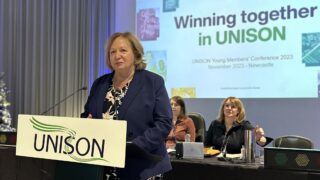Tessa Ngwiringwiri remembers her first job after leaving college. “It was a one-to-one job,” she says. “So you go into a person’s house and then you do support with them. Making a cup of tea or whatever they need at the time.
“And I was getting paid … I’d say I was getting paid £4.50 for an hour to £5, but someone alongside me who was 26 would be getting £7 or £8 an hour.
“And you think: ‘I’m doing the same work’. So the only difference there is that in essence, you’re younger. Which for me doesn’t make sense. At the time, it didn’t and up till now it doesn’t make sense.”
That glaring difference in minimum wage rates was why Tessa, a UNISON young member from Southampton, joined a number of her colleagues at the Palace of Westminster on 1 April, mixing with MPs and members of the House of Lords, to help launch the union’s #OneWageAnyAge campaign to abolish the discriminatory age bands as well as celebrate the 20th birthday of the minimum wage.

UNISON and its predecessor unions played a key role in campaigning for – and securing – the minimum wage in 1999 and well before.
Helping cut a birthday cake to mark the anniversary, Labour leader Jeremy Corbyn commented: “I want to say ‘thank you’ to UNISON and to NUPE and to NALGO – that’s where the fight for the minimum wage began.”
UNISON general secretary Dave Prentis remembered: “It was through our work that the minimum wage got into Labour’s ’97 manifesto and then into law.”
It was, he added, “a massive change that you put a floor in place that said: ‘I am a human being and will not be abused’.”
But, said Mr Prentis, even in 1999 the union was clear that the rate it was introduced at “was too low, so in 2001 we formed a living wage campaign and we’ve always campaigned since.”
In particular, he said, “we’ve always been against age differentials – one wage, any age!”
As Ms Ngwiringwiri stated: “Wages should be the same. Whether you’re older or younger. I’m happy that UNISON’s taken on that cause.”
Shadow business secretary Rebecca Long-Bailey also spoke at the UNISON event, pledging that a Labour government “will legislate for a minimum wage of £10 an hour – and that’s not an aspiration: it’s a floor. We will also set up a ministry of labour and we will make sure that every union has the right to go into every workplace and negotiate better.”










